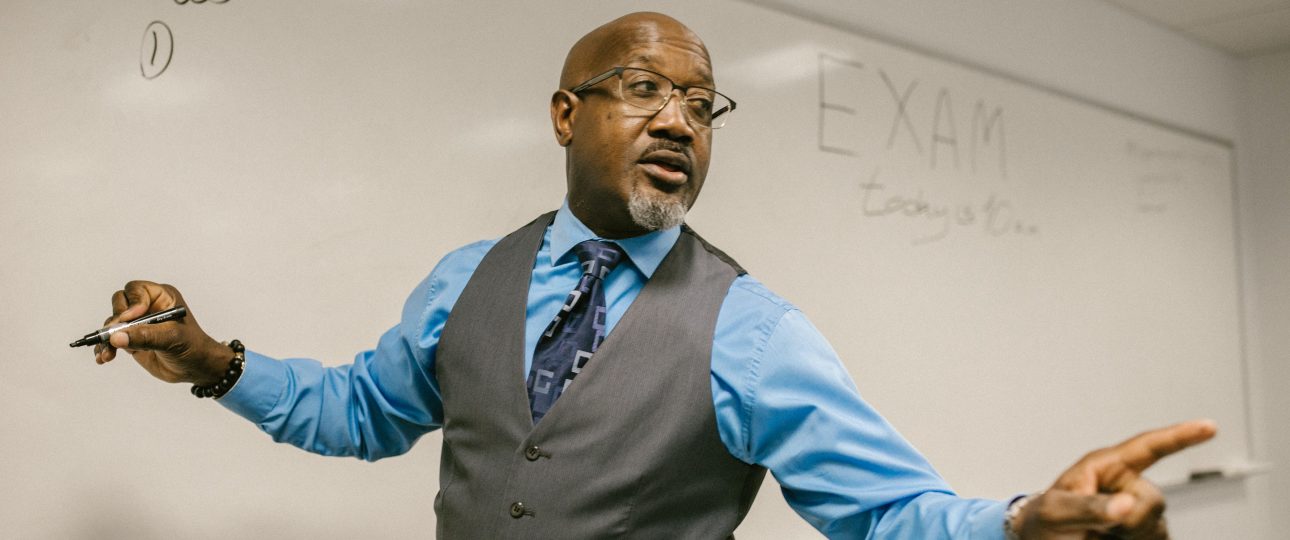
How to Become a College Professor: A Comprehensive Guide
Every one of us at some point in life chooses a profession. For some engineering is appealing while some prefer the medical field. Yet some opt for the banking sector while others like working in factories. Likewise, many also opt for becoming an academic like school teachers, lecturers, and college professors. This guide is for aspiring college professors and here we are going to discuss who really is a professor and how to become and move up in this noble career path.
Who is a College Professor?
A college professor is an educator who teaches and conducts research at the college or university level. These academics are experts and are more qualified than teachers and lecturers. This profession requires one to attain higher academic degrees and conduct and supervise research in the respective field of study. College professors may teach undergraduate or graduate courses, advise students, conduct research, publish scholarly articles and books, and participate in academic conferences and seminars.
Benefits of Becoming a College Professor
While becoming a professor is a challenging task and requires a lot of patience, hard work, research, and expertise in a given field of study. An experienced professor is considered an authority figure in his or her subject. While becoming a professor may be challenging but it is a highly rewarding profession and there are many benefits to becoming a college professor.
First of all, a professor can make a significant impact on the lives of his students and contribute to the advancement of knowledge in the given field. Next, it offers a high degree of intellectual freedom and flexibility, enabling you to pursue your research interests and shape your own career trajectory. Finally, the job of professors is relatively secure and has handsome financial remunerations like competitive salaries, and generous benefits such as health insurance, retirement plans, and paid time off.
Education and Experience Requirements for Becoming a College Professor
Educational Requirements
There are certain academic requirements for becoming a professor. Usually, you will need to attain a higher academic degree like a graduation or even a postdoctoral qualification to be eligible for teaching as a professor in a college.
(a) Undergraduate Degree
Earning an undergraduate degree is the first step toward becoming a college professor. You must choose an undergraduate degree program that you want to teach later in college. This undergraduate degree will provide you with a solid foundation in your subject area and help you develop critical thinking, analytical, and communication skills. It is important to choose a reputable college or university with a strong program in your field of study.
(b) Graduate Degree
After completing your undergraduate degree program, now you have to secure a graduate degree in your field. A graduate degree will further enhance your knowledge of the subject and will equip you with important skills research skills, critical thinking, and analytical approach, and will expose you to teaching and research experience.
(c) Postdoctoral Training
While some fields only require graduation to be eligible for teaching in a college, some other academic disciplines can’t be taught with only a graduate degree. So, to succeed as a college professor in such academic disciplines, you need to complete postdoctoral training after earning a doctoral degree. This training may involve working as a research assistant or fellow at a university or research institution to gain additional research experience and publish scholarly articles.
Experience Requirements
In addition to educational requirements, there are some experience requirements for becoming a full-fledged college professor. Usually, the following types of experience are required for becoming a seasoned college professor.
(a) Teaching Experience
First of all, you must have extensive teaching experience before applying for the post of college professor. You can gain teaching experience by working as a teaching assistant during graduate school, leading your own short courses as an instructor, or working as an adjunct professor at a college or university. In addition to developing your teaching skills, this experience will help you build a network of contacts in academia and develop a reputation as a skilled educator.
(b) Research Experience
After gaining sufficient teaching experience, you now need to develop research experience in the field. After teaching, it is the most sought-after requirement for becoming a professor. Research experience is needed not only for becoming a professor but it will also ensure your success in academia. For developing research experience, you may need to conduct original research, publish scholarly articles in reputed journals, collaborate with other scholars, and presenting your findings at academic conferences and seminars.
(c) Professional Development
After getting sufficient teaching and research experience, now you will need to focus on your professional development. This may involve attending workshops and training sessions to improve your teaching and research skills, staying up-to-date with the latest developments in your field, and pursuing additional certifications or degrees to advance your career.
Teaching as a College Professor
Once you have achieved the requisite education and experience requirements then you may now apply for the slot of a college professor and hopefully, you will get the job. After being selected as a college professor, it is time to start the career path.
Preparing Course Material
Your primary task at the onset of your career as a college professor will be to teach the students. For effective teaching, you will need to prepare course material properly. You must ensure that your teaching material is engaging, informative, and challenging. This may involve developing lectures, creating assignments and exams, and selecting readings and other course materials.
Delivering Effective Lectures
After preparing lectures, you must deliver them effectively. Delivering effective lectures is an art and it is critical to engaging and motivating your students. To deliver effective lectures, you will need to:
- Be well-prepared and organized
- Speak clearly and confidently
- Using visual aids for explaining complex topics and key points
- Ensuring two-way communication so that students can participate
- Provide real-world examples and case studies for helping students to grasp abstract concepts
Engaging Students in Learning
In all teaching methodologies, engaging students in class activities is strongly encouraged as student engagement enhances their understanding of the subject. For engaging students in learning, you will need to create a supportive and inclusive classroom environment that encourages participation and collaboration. You may adopt the following strategies for engaging your students in the class.
- Use active learning techniques such as group work, discussions, and debates
- Providing regular feedback and opportunities for reflection and self-assessment
- Encouraging students to connect course material to their own experiences and interests
- Creating opportunities for students to apply their learning through real-world projects or internships
Grading and Assessing Students Work
If delivering effective lectures and engaging students in the class is a critical component of college teaching then grading and assessing students’ work is also an important part of being a college professor. To do this effectively, you will need to:
- Establish clear grading criteria and communicate them to students
- Provide timely and constructive feedback on assignments and exams
- Use a variety of assessment tools such as written assignments, presentations, and group projects
- Ensure that grading is fair and consistent across all students
How to become a prominent college professor?
You can’t achieve prominence among college faculty members from day 1 as it takes time and a lot of effort. However, with time and dedication, you will achieve prominence in academia.
Obtaining Tenure
Tenure is a status granted to college professors after a probationary period, typically lasting six years. Tenure provides job security and protection from dismissal without cause. To achieve tenure, you will need to:
(a) Understanding the Tenure Process
Though the general probationary period is six years but tenure process shows variation. It varies from college to college. However, completing tenure often involves a comprehensive review of your teaching, research, and service contributions to the college or university. For obtaining tenure, you will need to familiarize yourself with the specific criteria and timeline for your institution’s tenure process.
(b) Meeting Tenure Criteria
After understanding the tenure process of your college or university, you must try to demonstrate excellence in teaching, research, and service. This may involve publishing high-quality research, receiving positive evaluations from students and colleagues, and participating in university committees and professional organizations.
(c) Preparing for Tenure Review
It is not only sufficient to demonstrate your professional competence during your tenure period. Rather you will convince your college or university of your professionalism by providing concrete evidence of your accomplishments in teaching, research, and service rendered to the institute. This may involve compiling a portfolio that includes your curriculum vitae, teaching evaluations, research publications, and letters of recommendation.
Achieving Promotion
After obtaining tenure, now you may become eligible for promotion to the next higher job title. Often you join the college as an assistant professor and then you move up the ladder. The next higher ranks after assistant professor are an associate professor and full professor. To achieve promotion, you will need to:
(a) Moving Up the Ranks
Promotion within academia is based on continued excellence in teaching, research, and service. As you progress in your career, you will need to maintain a strong record of scholarly publications, secure external funding for your research, and contribute to the development of your department and university.
(b) Meeting Promotion Criteria
Though continued academic excellence and research, paper publications are needed for the promotion but it is to note that every college or university has its own promotion criteria. Most institutions’ promotion criteria include factors like the number and quality of your research publications, your impact on student learning, and your contributions to the university community.
(c) Preparing for Promotion Review
Once you have fulfilled the promotion criteria to the next higher rank then you may go through the process of promotion review. The promotion review process is similar to the tenure review process, and during this review process, the review board will evaluate the evidence of your accomplishments in teaching, research, and service. You will also need to update your portfolio with recent achievements and solicit letters of support from colleagues and external evaluators.
Publishing research papers while teaching in the college
As discussed earlier, you will need to do continuous research while teaching in a college or university in the capacity of a professor. Professor and research are tied forever.
Conducting Research as a College Professor
Research is a critical component of being a successful college professor. To conduct research effectively, you will need to:
(a) Finding Funding Sources
Research not only requires academic effort but also involves handsome finances. You will need funding to cover the cost of equipment, materials, and travel expenses. As a college professor, you will need to identify funding sources such as grants, fellowships, and scholarships to support your research endeavors.
(b) Developing Research Proposals
Once you have identified a potential funding source, then you will need to develop a research proposal. For securing the funding, your research proposal must be creatively crafted. It must include all the necessary research elements like your research question, methodology, and expected outcomes. This proposal will need to be reviewed and approved by your colleagues and university administration before you can begin your research.
(c) Conducting the Research
After receiving approval for your research proposal, you can now begin conducting your research. Based on your research proposal, your research may involve collecting data, running experiments, or analyzing existing data sets. Throughout this process, it is important to maintain accurate records and adhere to ethical guidelines for research involving human subjects or animals.
Publishing in Academic Journals
After conducting successful research, it is time to publish your research in reputed academic journals. Besides research papers, you can also publish scholarly articles and books relating to your subject.
(a) Choosing the Right Journal
Whether you have a research paper or a scholarly article, you will need to choose the right journal for your publication. Selecting the right journal is critical to ensuring that your researchor article is read and cited by other scholars in your field. You should choose a journal that is respected and well-regarded in your area of study, and that has a high impact factor.
(b) Formatting Your Manuscript
Once you have chosen a journal, you will need to format your manuscript according to the journal’s guidelines. This may involve following specific citation styles, formatting references, and using appropriate headings and subheadings.
(c) Responding to Peer Review
After submitting your manuscript, it will be reviewed by other scholars in your field. You will need to respond to their feedback and make revisions as necessary to improve the quality and impact of your research or article.
Continuing Education and Professional Development
You may attain professional excellence after working in academia for some time but for maintaining your status as a distinguished educator, you will need to keep yourself updated with the latest research in your subject, attending academic conferences, and improving your academic qualifications in your subject further.
Keeping Up with Changes in the Field
Every study field is fast evolving due to recent inventions and technological advancements. You must be abreast with the latest changes and discoveries in your field for remaining ahead of your competition. For maintaining the status of a distinguished college professor, you must stay current with changes and advancements in your field and you can do it by reading academic journals, attending conferences and workshops, and participating in online forums and professional organizations.
Attending Conferences and Workshops
Likewise reading reputed academic journals, attending academic conferences and workshops will also help you to learn about new developments in your field. In addition, your professional networks will also expand as you will meet other professionals, and present your own research. These events can also provide valuable opportunities for professional development, such as training in new teaching methods or technologies.
Pursuing Certificates and Additional Degrees
Though you will need the highest academic qualifications for becoming a college professor, however, you can always improve your academic portfolio by pursuing additional certifications or degrees in your field. This could include obtaining a specialized certificate in a relevant discipline or pursuing an additional graduate degree in a complementary field.
Summing it Up
Becoming a college professor is a challenging yet rewarding career path that requires dedication, persistence, and passion for your field of study. By meeting the necessary educational requirements, gaining valuable teaching and research experience, and engaging in ongoing professional development, you can achieve success in academia and make a lasting impact on the lives of your students and the advancement of knowledge in your discipline.
Frequently Asked Questions
Q: How can I stay updated with the latest changes and discoveries in my field?
A: To stay current with changes and advancements, read academic journals, attend conferences and workshops, participate in online forums, and join professional organizations related to your field.
Q: Why is attending academic conferences and workshops important for college professors?
A: Attending conferences and workshops helps you learn about new developments, expand your professional network, present your research, and access opportunities for professional development such as training in new teaching methods or technologies.
Q: Can pursuing additional certifications or degrees benefit my career as a college professor?
A: Yes, obtaining specialized certificates or additional graduate degrees in relevant disciplines can enhance your academic portfolio and improve your expertise in your field.
Q: What are the key requirements to become a successful college professor?
A: The key requirements include meeting necessary educational qualifications, gaining valuable teaching and research experience, and engaging in ongoing professional development.
Q: How can I make a lasting impact as a college professor?
A: By being dedicated, persistent, and passionate about your field of study, you can contribute to the advancement of knowledge and positively influence the lives of your students.







